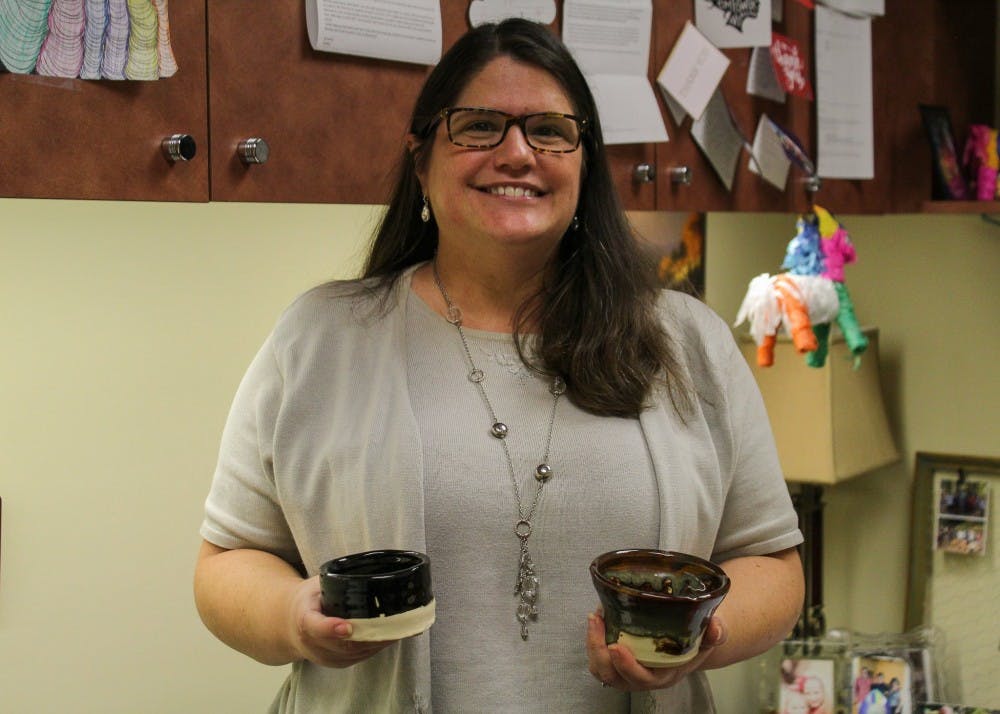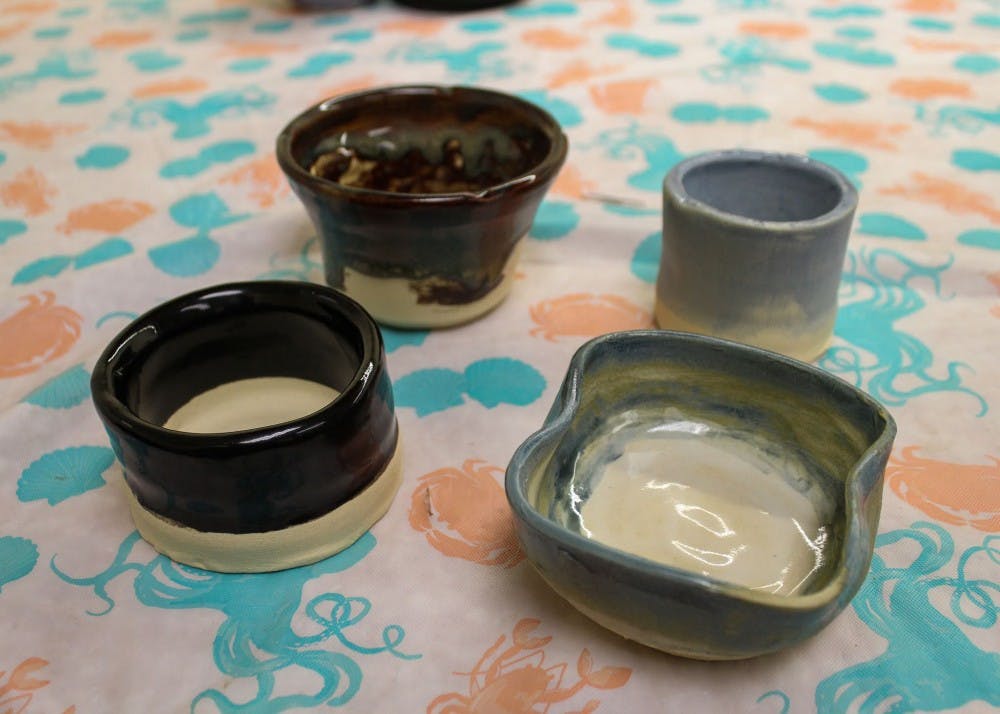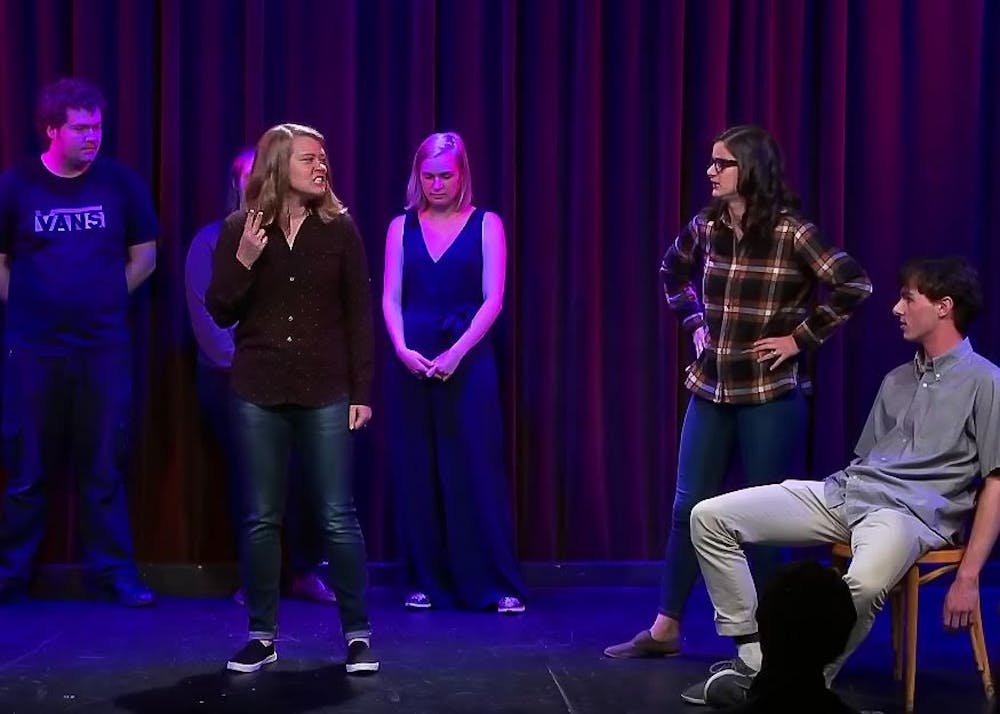UP staff members have all kinds of peculiar pastimes outside of their jobs. Prepare to peer into the lives of three Pilots with passion for the arts, featuring the poet, the potter and the performer.
The Poet
For the last 13 years, adjunct English professor Matthew Minicucci has written almost every day. The art of poetry first sparked his interest at an undergraduate summer program in 2006.
“I wake up pretty early and I’ll write for at least a couple of hours,” Minicucci said. “If I’ve gotten my writing done in the morning, or at least my editing or my reading done in the morning, I feel accomplished. So everything that happens the rest of the day is okay.”

Matthew Minicucci, an adjunct English professor, has been writing poetry for twelve years. His latest book, Small Gods, was a 2016 Green Rose Prize finalist.
When Minicucci first started writing, it was a way to work through his feelings and express them in an artistic way. His first book of poetry, “Translation,” examined the dissolution of his nuclear family through the lens of Greek mythology.
“I noticed that in all of these classical myths, the drama was all about family issues,” Minicucci said.
Minicucci took a different approach with his second book. “Small Gods” looked at the intersection of faith and science in a person’s life as they experience the loss of a loved one.
Minicucci’s poems are written mostly in prose with a lyrical style. Rather than focusing on narratives, lyric poems examine sounds, images or metaphors, Minicucci said.
“(Lyric style) would employ those techniques to try to elicit a reaction from the audience outside of a reaction to a character or to a narrative,” Minicucci said.

Minicucci often handwrites his ideas in a notebook.
This style is regularly used by poets like Emily Dickinson to examine existential topics like love and death. Minicucci found inspiration in the works of Dickinson, his former summer teacher, Dean Young, and former graduate school professor, Bridget Kelly.
“I think there’s some uncanny things that happen in poetry,” Minicucci said. “What I try to bring to writing instruction, when I’m teaching, is that you have to sit down and do the work.”
The first draft is never right, Minicucci said. After first writing an idea out by hand, he goes through dozens of versions before reaching a final product. He keeps all of these versions to look back on for inspiration.
This spring, Minicucci is teaching two sections of English 107, college writing.
“I always feel like my students sort of make me feel more inspired about writing,” Minicucci said. “I think that it’s really important for me to remember, important for me to say, that we all have a lot of parts to ourselves.”
The Potter
Last October, business instructor Montana Hisel-Cochran wanted to try “something creative, but also useful.” Pottery seemed to be the natural choice. Now, every Saturday, Hisel-Cochran ventures to St. John’s Clay Collective to de-stress and make gifts for friends and family. So far, Hisel-Cochran has made planters, mugs and candy bowls.
“It’s given me a whole appreciation for any kind of hand made product, because it takes hours,” Hisel-Cochran said. “It is the process that takes a lot of time and a lot of commitment to make something in clay.”

Montana Hisel-Cochran, a professor of the Pamplin School of Business, has been taking pottery classes at St. John's Clay Collective since October.
Pottery has been a big stress reliever for Hisel-Cochran. When she first started sculpting, Hisel-Cochran wanted a challenge and to develop a new skill. In doing so she discovered a lot about the learning process.
“(Pottery) reminds me how when you are brand new to something, that it really does take a long time to grasp the concepts,” Hisel-Cochran said.
Hisel-Cochran said she wishes every professor would try something new so they could better relate to students struggling with unfamiliar concepts.

These pots are Montana's first successful pieces. She plans to use them to hold succulent plants.
“I’m becoming comfortable with this idea of progress and not perfection, which is something that we as instructors and professors need to remember, that all of our students come in at different levels,” Hisel-Cochran said.
For Hisel-Cochran, pottery gives her a common ground with her students.
“Continuing to push yourself to learn something new is never gonna be a bad thing,” Hisel-Cochran said. “It took me a year and a half to convince myself to make the time, and spend the money, and make the commitment to do (pottery)... but I don’t regret it.”
The Performer
When Courtney Campbell first moved to Portland in 2017, she wanted to make new friends in a new city. Campbell was hired as the program manager of first year programs for the Shepard Academic Resource Center (SARC) in January 2018.
“I had a friend of mine when I lived in Atlanta who did improv, and she loved it,” Campbell said. “I thought back to how much fun she had because she was new to Atlanta and jumped into the improv scene there and met a lot of really great people. I thought well, why don’t I do that here in Portland?”
In an email, Campbell explained that improv helped her cope with regular anxiety.

Photo courtesy of Curious Comedy Theater.
“Improv trains your brain to be present in the moment, focused on the support you have with you in your scene,” Campbell said. “This mindfulness is such a great tool to have offstage when I experience an anxiety episode.”
Campbell spends about two hours a week at the Curious Comedy Theater taking improv classes with a team of eight to nine. The group uses a style of improv called the Harold format, similar to the TV show “Seinfeld.” For the first half of 2019, Campbell's team will be performing twice per month.
More recently, Campbell formed her own group with some fellow classmates called lil’ Candace, named after an inside joke. In November 2018, lil’ Candace won a voting-based improv competition called Thursday Night Throwdown.
“Just to think back and recognize that I just started this in January and I’m already playing with folks on a Friday night main stage is great,” Campbell said.

Courtney Campbell, the Program Manager of First Year Programs, demonstrates an improv exercise - switching between laughing and crying.
Campbell said that improv has taught her a lot about communication. A core tenet of improv is saying “yes, and” rather than “no,” which has influenced her work greatly.
“I’ve essentially eliminated ‘no’ from my vocabulary, which is really interesting to think about, considering the work I do here at UP deals a lot with policies, procedures and regulations,” Campbell said.
Campbell has even presented this concept at academic conferences, encouraging others to work alongside students, rather than “imposing a no.” At these conferences, Campbell has attendees play improv games to get into a “yes, and” mindset.
“I think for me, improv and its basic tenets of basic support… has really impacted me on a basic human level,” Campbell said. “Supervising the students that I do here at UP with the first year workshop program and the academic coaches, I’ve had the opportunity to really infuse my supervisory strategies with improv.”
Cushing is a reporter at The Beacon. He can be reached at cushing20@up.edu.







